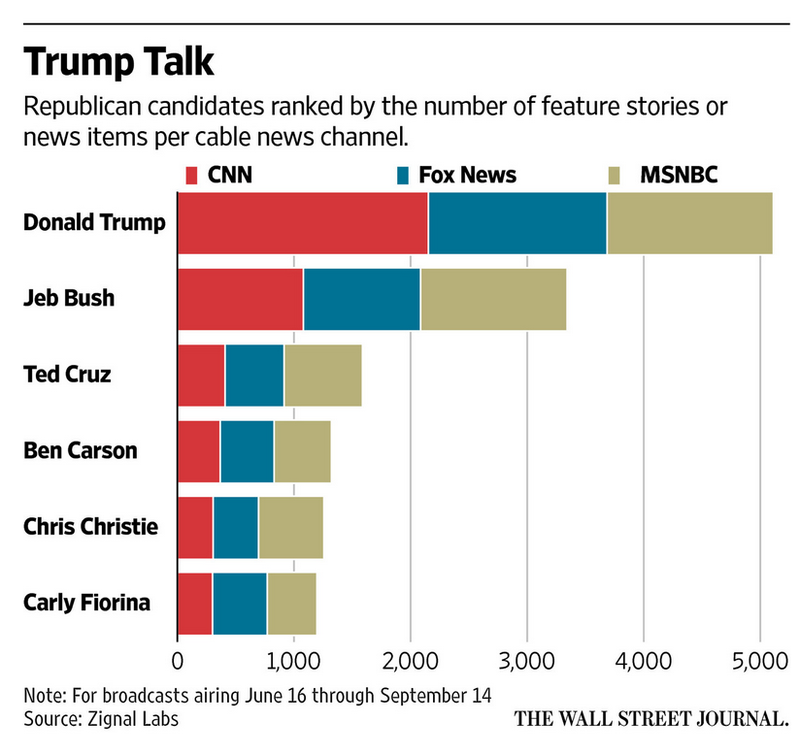Sign up for the daily CJR newsletter.
Donald Trump blots out the sun—at least when it comes to media coverage of the GOP primary field—and a growing chorus of critics contend that it’s coming at the expense of other candidates’ ideas. Anecdotal evidence of Trump’s media incandescence builds by the day. But this week Zignal Labs, a San Francisco-based analytics firm, released the latest rounds of empirical data, showing that Trump has dominated both traditional and new media in the lead-up to the Republican debate tonight in Simi Valley, California.
The most recent Zignal Labs analysis, cited by The Wall Street Journal on Tuesday, found that the tycoon-turned-candidate had been the subject of least 2,159 CNN reports between his June 16 announcement and Monday. That’s roughly double the number of Jeb Bush-centric stories during that span, while only one other Republican candidate, Senator Ted Cruz, cracked 400 pieces. CNN is hosting tonight’s debate.
The two other cable news channels have featured more balanced coverage among candidates, though frontrunner Trump still gets the most attention. As Joe Flint and Rebecca Ballhaus report, Trump “has been discussed or covered on Fox 1,540 times since announcing his candidacy while Mr. Bush has received 1,012 mentions. MSNBC has featured Mr. Trump in 1,426 stories and Mr. Bush in 1,257 features or news items.”
Graphic by The Wall Street Journal
Trump’s media domination also extends beyond Trump-focused cable stories. Another Zignal Labs analysis, reported in The Washington Post’s Daily 202 newsletter on Monday, found that the real estate magnate had been mentioned more than his opponents on social media and “all the TV news channels” since the August 7 GOP debate.
Trump racked up 6.6 million mentions on Twitter during that timeframe. He was followed by Cruz, with 1.1 million, and Bush, with 935,000. The understated Carson received a mere 587,000. TV channels, meanwhile, referred to Trump about 91,000 times. That compares to roughly 75,000 mentions for Bush and 34,000 of Carly Fiorina. Carson, who has catapulted to second place in some national polls, topped out the rest of the field at about 26,000 mentions.
“A lot has happened in those four weeks: Carly got a bounce, Carson surged and [Rick] Perry folded,” The Post’s James Hohmann and Elise Viebeck wrote. “But television news producers do not necessarily see the race that way.”
To be fair, Trump leads the GOP field in many national polls. Popular excitement for his message is palpable (his speech Monday in Dallas drew almost 20,000) and newsworthy. He’s bound to no script, making his appearances and interviews inherently more interesting than those of his more cautious opponents. And as CNN pointed out to the Huffington Post on Monday, Trump makes himself more readily available to political journalists than his opponents.
“If anything, the question should be why is Hillary Clinton, or other candidates, why are they not doing as many interviews as Donald Trump?” CNN’s Jake Tapper told the Huffington Post’s Michael Calderone.
That’s a fair counterargument. Still, the numbers lend credence to many candidates who contend that Trump, who has no coherent policy platform, receives an outsized share of media coverage. New Jersey Governor Chris Christie made his case for more attention on Tuesday to Fox News’ Megyn Kelly, herself a target of previous Trump barbs. As Talking Points Memo reports:
Host Megyn Kelly opened the interview with a question about the recent comments of Miss America contestant Meg McGuffin, who said that Republicans should be “absolutely terrified” of the amount of attention Trump receives.
When asked if he was concerned, Christie replied that getting attention is “one of the things that Donald has always been very good at” but that it’s ultimately up to the other candidates “to make sure that people hear our voices.”
“You have to be more exciting and then we would cover you more,” Kelly shot back.
Unfortunately for voters, candidates’ ability to generate excitement is a barometer for exactly nothing in the Oval Office. And that, of course, presents a quandary for journalists aiming to both capture the public’s attention and hold candidates accountable. Trump is the walking, talking personification of this paradox: Critical coverage has not stuck, and audiences keep coming back for more.
Has America ever needed a media defender more than now? Help us by joining CJR today.







